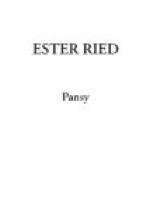“They thought her dying when she
slept,
And sleeping when she died.”
Into the brightness of the September days there intruded one, wherein all the house was still, with that strange, solemn stillness that comes only to those homes where death has left a seal. From the doors floated the long crape signals, and in the great parlors were gathering those who had come to take their parting look at the white, quiet face. “ESTER RIED, aged 19,” so the coffin-plate told them. Thus early had the story of her life been finished.
Only one arrangement had Ester made for this last scene in her life drama.
“I am going to preach my own funeral sermon,” she had said pleasantly to Abbie one day. “I want every one to know what seemed to me the most important thing in life. And I want them to understand that when I came just to the end of my life it stood out the most important thing still—for Christians, I mean. My sermon is to be preached for them. No it isn’t either; it applies equally to all. The last time I went to the city I found in a bookstore just the kind of sermon I want preached. I bought it. You will find the package in my upper bureau drawer, Abbie. I leave it to you to see that they are so arranged that every one who comes to look at me will be sure to see them.”
So on this day, amid the wilderness of flowers and vines and mosses that had possession of the rooms, ranged along the mantel, hanging in clusters on the walls, were beautifully illuminated texts—and these were some of the words that they spoke to those who silently gathered in the parlors:
“And that knowing the time, that now it is high time to awake out of sleep.”
“But wilt thou know, O vain man, that faith without works is dead?”
“What shall we do that we might work the works of God?”
“Whatsoever thy hand findeth to do, do it with thy might; for there is no work, nor device, nor knowledge, nor wisdom in the grave whither thou goest.”
“I must work the work of him that sent me while it is day: the night cometh when no man can work.”
“Awake to righteousness and sin not.”
“Awake thou that sleepest, and arise from the dead, and Christ shall give thee light.”
“Redeeming the time, because the days are evil.”
“Let us not sleep as do others, but let us watch, and be sober.”
Chiming in with the thoughts of those who knew by whose direction the illuminated texts were hung, came the voice of the minister, reading:
“And I heard a voice from heaven saying unto me, Write, Blessed are the dead which die in the Lord from henceforth: Yea, saith the Spirit, that they may rest from their labors; and their works do follow them.”
So it was that Ester Ried, lying quiet in her coffin, was reckoned among that number who “being dead, yet speaketh.”




